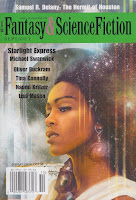
(Horror) In which a military conquest is described in terms of the wines produced near each of the conquered cities. (1,598 words; Time: 05m)
Rating: ★★★★☆ Crisp with a surprising aftertaste
"Tasting Notes on the Varietals of the Southern Coast," by Gwendolyn Clare [bio] (edited by C.C. Finlay), appeared in Magazine of Fantasy & Science Fiction issue 09-10|17, published on September 1, 2017 by Spilogale Inc.
Mini-Review (click to view--possible spoilers)
Pro: The prose evokes the beauty of the southern-coastal cities, the misery of how their people died, and—increasingly—the monstrosity of the emperor who destroyed all of this just to seize their vineyards. The insensitive narrator adds effectively to the horror.
The breath master—the man who created the plague—can’t help but see the faces of his own loved ones in the masses of the dead. Listening to the screams of the dying, sampling the wines that everyone died for, it’s no wonder he ends his own life.
Con: There’s no actual plot or character development.
Other Reviews: Search Web, Browse Review Sites (Issue 09-10|17)
Gwendolyn Clare Info: Interviews, Websites, ISFDB, FreeSFOnline
Follow RSR on Twitter, Facebook, RSS, or E-mail.
The breath master—the man who created the plague—can’t help but see the faces of his own loved ones in the masses of the dead. Listening to the screams of the dying, sampling the wines that everyone died for, it’s no wonder he ends his own life.
Con: There’s no actual plot or character development.
Other Reviews: Search Web, Browse Review Sites (Issue 09-10|17)
Gwendolyn Clare Info: Interviews, Websites, ISFDB, FreeSFOnline
Follow RSR on Twitter, Facebook, RSS, or E-mail.
Rather than horror, the aftertaste (pun intended) of this story is more of very dark humour.
ReplyDeleteI wonder if this might be better classed as "dark fantasy." I'm still trying to make up my mind about the best way to use that term.
DeleteA great point to raise. Probably, fantasy needs some darkness in it, and the best can be very dark, from Little Red Riding to Tolkien. But maybe the difference with what nowadays we would call dark fantasy is that in fantasy there is meaning (to sorrow and to life), while dark fantasy is mostly devoid of hope.
DeleteOften we see them reduced to finding meaning in still adhering to a last small set of rules for personal ethics and inmediate pleasures, like some detectives in hard-boiled noir stories. Maybe the Black Company and The Witcher (the latter with an inch more hope now and then) could have become classic examples.
In this case the dark fantasy tag would fit the tale with honors but still, with the caveat that probably the best fantasy (without any tag) requires darkness. And yes, the tale is rather appalling as the story developes and the reader wonders why all this and maybe suspicion grows, all rather fast since the story is quite short. So horror would fit as well, only that the aftertaste is a bit more complex. Instead of short-and-sweet, it is short-and-sour and invites to a silent horrified imaginary laughter.
Thanks for these reviews and all of RSR!!!
Very clever!
ReplyDelete